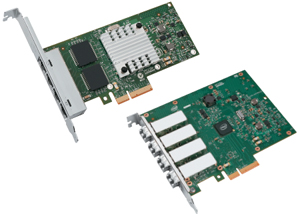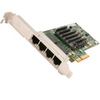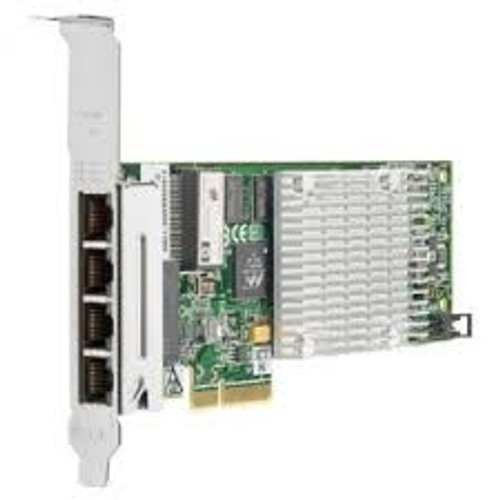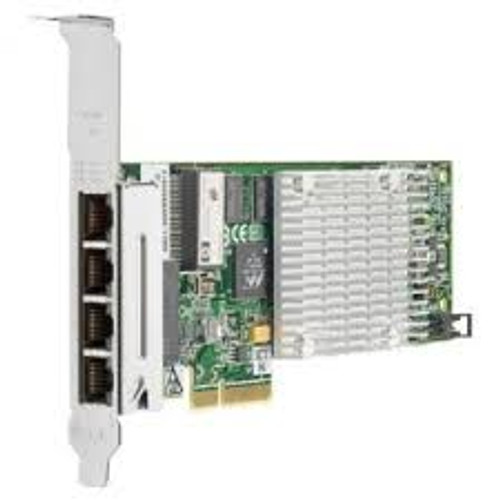
Quad-port Gigabit Ethernet server adapter designed for multi-core processors and optimized for Visualization & Unified Networking Environments
- Four high-performing 10/100/1000 BASE-T Ethernet connec¬tions (Copper)
- Four high-performing 10/100/1000 BASE-5X Ethernet connec¬tions (Fiber)
- Low power high performing bridgeless design supporting PCI Express* Gen 2.0 5 GT/s
- Environmentally-friendly halogen-free (Copper) and lead-free adapter
- Hardware acceleration for TCP-IP and iSCSI
- Hardware optimizations for virtualized servers
- Reliable and proven Gigabit Ethernet technology from Intel Corp.
Based on the new Intel 82580 Gigabit Ethernet Controller, the Intel Ethernet 1340 Server Adapter is Intel's fourth gener¬ation of PCIe GbE adapter. This adapter showcases the indus¬try's first fully integrated quad-port PCIe Gen2 GbE controller, providing a smaller footprint and lower power dissipation. In addition, the Intel Ethernet 1340 Server Adapter offers ad¬vanced features, including support for multi-core processors and server visualization, as well as a scalable PCI Express Gen 2.0 interface. Intel's first eco-friendly halogen-free board com¬bines low-power and cost for the best price/performance ratio in a quad-port solution available today.
Halogen-Free
Working to create a more environmentally sustainable future, Intel is pleased to introduce its first halogen-free Ethernet Server Adapter. The transition to halogen-free products is not govern¬ment mandated, but driven by Intel's goal to eliminate the use of environmentally sensitive materials. The move to halogen-free products marks another step in our continual march toward mini¬mizing the environmental footprint of Intel's products, processes, and technologies.
Designed for Multi-Core Processors
This quad-port adapter provides high-performing, multi-port Gigabit connectivity in a multi-core platform as well as in a virtualized environment. In a multi-core platform, the adapter supports technologies such as MSI-X, and Low Latency Inter¬rupts that help accelerate data across the platform, improving application response times.
The I/O technologies on a multi-core platform make use of the multiple queues and multiple interrupt vectors available on the network controller. These queues and interrupt vectors help in load balancing the data and interrupts amongst themselves in order to lower the load on the processors and improve overall system performance. For example, depending upon the latency sensitivity of the data, the low latency interrupts feature can bypass the time interval for specific TCP ports or for flagged packets to give certain types of data streams the least amount of latency to the applica¬tion.
Intel I/O Acceleration Technology (Intel l/OAT) is a suite of features that improves data acceleration across the platform, from networking devices to the chipset and processors, which helps to improve system performance and application response times. The different features include MSI-X, Low-Latency Interrupts, Receive Side Scaling (RSS), and others. MSI-X helps in load-balancing I/O interrupts across multiple processor cores, and Low Latency Interrupts can provide certain data streams a non-modulated path directly to the application. RSS directs the interrupts to a specific processor core based on the application's address.
Support for iSCSI
Intel Ethernet server adapters with native iSCSI initiators built into Microsoft Windows Linux, and VMware ESX platforms provide a simple, dependable, cost-effective way to connect to LANs and iSCSI SANs. These-native initiators are broadly tested using multiple generations of operating systems, storage systems, and OS tools to help ensure reliability and ease of use. Standardizing on Intel Ethernet server adapters for iSCSI allows administrators to use a single initiator, TCP/IP stack, and set of management tools and IT policies. In addition, the 1340 server adapter includes a number of hardware features designed to accelerate iSCSI traffic and enhance data processing. For example, TCP segmentation offload, Receive side coalescing (RSC), and checksum offload capabilities help reduce processor utilization, increase throughput, and deliver exceptional iSCSI performance. The adapters are designed to flexibly scale workloads across multi-core processor-based systems. Finally, using native OS initiators, an Intel Ethernet 1340 Server Adapter enables support for the CRC-32 digest instruction set included in the Intel Xeon processor 5500 series, which improves transmission reliablity and thus delivers an enterprise class iSCSI solution for the IT customer.
Optimized for Visualization
The Intel Ethernet 1340 Server Adapter showcases a suite of hardware assists that improves overall system performance by lowering the I/O overhead in a virtualized environment. This optimizes CPU usage, reduces system latency, and improves I/O throughput. These features include:
- Virtual Machine Device Queues (VMDq)
- Intel I/O Acceleration Technology (Intel l/OAT)
Use of multi-port adapters in a virtualized environment is very important because of the need to provide redundancy and data connectivity for the applications/workloads in the virtual machines. Due to the need for redundancy and data connectivity, it is recommended that a virtualized physical server needs at least six GbE ports to satisfy the I/O requirement demands..
Virtual Machine Device queues (VMDq)
VMDq reduces I/O overhead on the hypervisor in a virtualized server by performing data sorting and coalescing in the network silicon. VMDq technology makes use of multiple queues in the network controller. As data packets enter the network adapter, they are sorted, and packets traveling to the same destination (or virtual machine) get grouped together in a single queue. The packets are then sent to the hypervisor, which directs them to their respective virtual machines. Relieving the hypervisor of packet filtering and sorting improves overall CPU usage and throughput levels.
Reliable Performance
The server adapter includes a number of advanced features that enable it to provide industry-leading quad-port IGbE performance and reliability. With over 25 years of experience shipping Ethernet adapters, Intel offers unmatched quality and design.
PCIe v2.0(5GT/s)
PCIe v2.0 (5 GT/s) support enables customers to take full advantage of the 1 GbE by providing a maximum of 2.0 Gbps bi-directional throughput per port on a single quad-port card.
For today's demanding virtualized data center environments, the new Intel Ethernet 1340 Server Adapter delivers ultimate flexibility and scalability.







